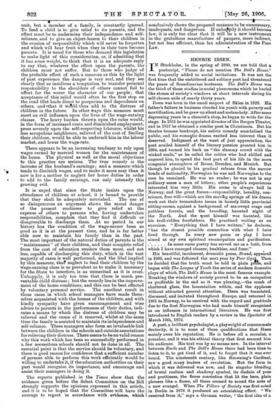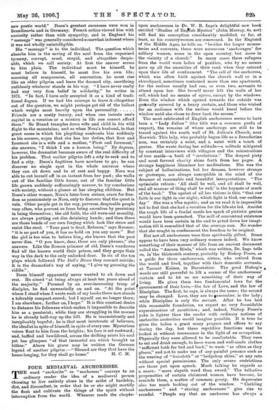HENRIK IBSEN.
IN Stockholm, in the spring of 1880, we are told that a postscript, " Please do not mention The Doll's House," was frequently added to social invitations. It was not the first time that the embittered and solitary poet had threatened the peace of Scandinavian hostesses. The Doll's House was the third of those studies in social phenomena which he hurled like stones at society's windows at short intervals during his self-chosen exile of nearly thirty years.
Ibsen was born in the small seaport of Skien in 1828. His father's failure in business clouded his youth with poverty and mortification, and he grew up silent and melancholy. After some depressing years in a chemist's shop, he began to write for the stage. In 1851 he was appointed director of the Bergen Theatre, and in 1857 he obtained a similar post in Christiania. But his theatre became bankrupt, his satiric comedy scandalised the public, and his romantic drama excited less interest than it deserved. Indignant at the want of just appreciation, the poet availed himself of the literary pension granted him in 1864, and turned his back on "the clammy crowd with the wicked smile," as he called the critics who had chilled and angered him, to spend the best part of his life in the more congenial atmosphere of Rome, Dresden, and Munich. But though he gloried in his gradual release from the narrow bonds of nationality, Norwegian he was and Norwegian to the core he remained. He was no reader; he was not in any ordinary sense a man of letters ; other people's experiences interested hint very little. His scene is always laid in Norway, and the great forces—responsibility, heredity, con- 'science, free will—which are the moving springs of his drama work out their tremendous issues in homely little provincial sitting-rooms, against a background of sea-swept crags and pathless forests, and the brooding, haunted night of the North. And the opoet himself was haunted, like his troll-ridden forefathers. He practised writing as an exorcism. " Everything that I have written," he declares, "has the closest possible connection with what I have lived through. In every new poem or play I have • aimed at my own spiritual emancipation and purification.
• In some cases poetry has served me as a bath, from which I have emerged cleaner, healthier, and freer!' His beautiful, incoherent, dramatic poem, Brand, appeared
in 1866, and was followed the next year by Peer Gynk. Then he decided that the truth must be told in plain pie, and began with The League of Youth the series of modern domestic plays of which The Doll's. House is the most famous example. Breaking the windows of society proved to be an occupation as profitable in the end as it was pleasing,—the crash of shattered glass, the lamentation within, and the applause without attracted general attention. Ibsen was translated, discussed, and imitated throughout Europe, and returned in 1891 to Norway, to be received with the regard and gratitude due to the first Norwegian who had made himself recognised as an influence in international literature. He was first introduced to English readers by a review in the Spectator of March 16th, 1872.
A poet, a brilliant psychologist, a playwright of consummate
dexterity, it is to none of these qualifications that Ibsen mainly owes his reputation. He is before all a moralist, a preacher, and it was his ethical theory that first secured him his audience. His text was by no means new. In the interval between Emile and The Doll's. House there had been time to listen to it, to get tired of it, and to forget that it was ever heard. The nineteenth century, like Browning's Cardinal, saw a good many leaders of revolution. But the form in which it was delivered was new, and 'its singular blending of brutal realism and shadowy symbol, its disdain of pose and prettiness, the fierce conviction that lit the bare, plain phrases like a flame, all these seemed to sound the note of a new evangel. When The Pillars of Society was first acted in .Berlin in .1878. it •produced an astonishing effect. " We received from it," says a German writer, " the first idea of a
new poetic world." Ibsen's greatest successes were won in Scandinavia and in Germany. French critics viewed him with curiosity rather than with sympathy, and in England his " message" was generally considered somewhat indecent where it was not wholly unintelligible.
His " message" is to the individual. The question which absorbs him is the saving of the soul from the organised tyranny, corrupt, cruel, stupid, and altogether despic- able, which we call society. At first the answer seems to him plain. The individual must be himself, he must believe in himself, he must live his own life ; scorning all compromise, all convention, he must rise like an older pilgrim and leave the doomed city, sacrificing ruthlessly whatever stands in his way. "I have never really bad any very firm belief in solidarity," he writes in 1871. "In fact, I have only accepted it as a kind of tradi- tional dogma. If we had the courage to leave it altogether out of the question, we might perhaps get rid of the ballast which weighs most heavily upon the personality Friends are a costly luxury, and when one invests one's capital in a vocation or a mission in life one cannot afford them." So Brand tramples down wife and child in his wild flight to the mountains; and so when Nora's husband, in that great scene in which his plaything confronts him suddenly as his accuser, urges that she has her duties, that first and foremost she is a wife and a mother, "First and foremost," she answers, "I think I am a human being." By degrees, however, the dramatist becomes aware of the real difficulty of his problem. That earlier pilgrim left a city to seek and to find a city. Ibsen's fugitives have nowhere to go ; he can discover no single spot in the whole universe where they can sit down and be at rest and happy. Nora was able to cut herself off in an instant from her past ; she walks out of the familiar little house, out of the familiar little life grown suddenly suffocatingly narrow, to try conclusions with society, without a glance at her sleeping children. But Ibsen's other women, Nora's later-born sisters, crave for free- dom as passionately as Nora, only to discover that the quest is vain. Other people get in the way, perverse, despicable people very often, who prevent us from being ourselves by persisting in being themselves ; the old faith, the old worn-out morality, are always putting out dim detaining hands; and then there are those bonds of our own forging which look like straw and resist like steel. " Your past is dead, Rebecca," says Rosmer; "it is no part of you, it has no hold on you any more." But the girl is too wise to believe him she knows that the past never -dies. " 0 you know, dear, these are only phrases," she answers. Like the Roman prisoner of old, Ibsen's wanderers find all the known world their prison, and they grope their way in the dark to the only unlocked door. In six of the ten plays which followed The Doll's House they commit suicide; it is the dramatist's way of saying, "I give up guessing the riddle.",
Ibsen himself apparently never wanted to sit down and rest. He aimed "at being always at least ten years ahead of the majority." Pursued by an ever-increasing troop of disciples, he fled unweariedly on and on. "At the point where I stood when I wrote each of my books there now stands a tolerably compact crowd; but I myself am no longer there; I am elsewhere ; farther on, I hope." It is this constant desire to distance his followers which makes it impossible to describe him as a pessimist; while they are struggling in the morass he is already half-way up the hill. He is inconsistently and inexplicably hopeful; he is that most inveterate of believers, the idealist in spite of himself, in spite of every one. Mysterious voices float to him from the heights; his face is set eastward ; and, baffled and bewildered, across the drifting mists his soul yet has glimpses "of that immortal sea which brought us hither." Above his grave may be written the German legend of another pilgrim :—"Blessed are they that have the home-longing, for they shall go home." H. C. M.











































 Previous page
Previous page